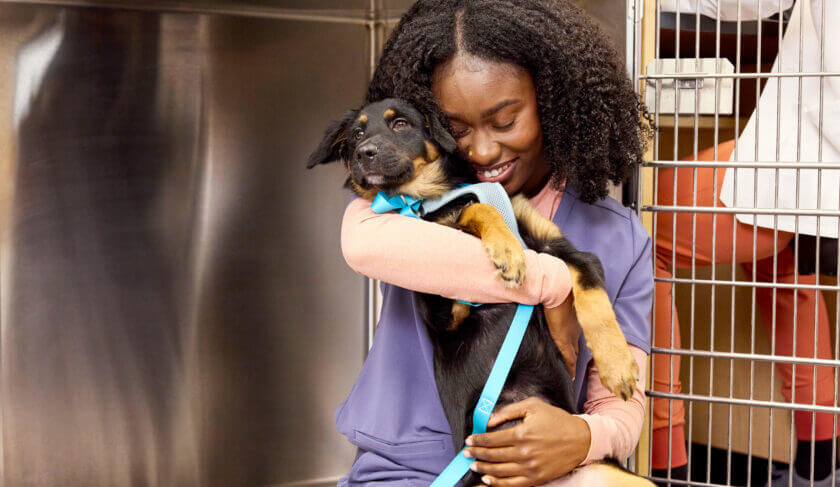
Note: This post is sponsored by Banfield Pet Hospital.
If you’re a pet owner, you already know the associated costs can add up. In fact, according to a recent study, the lifetime cost to care for a dog ranges from $19,893 to $55,132. One of the costliest parts of caring for a pet are expenses related to their medical care. Luckily, there are steps you can take to help keep your pet healthy and mitigate any medical issues before they bust your budget.
Good Health Starts At Home
For any pet owner, it’s important to know good health begins at home. A big part of ensuring good care for dogs is recognizing any changes in your dog’s health. That includes their dental health. Experts say dental health is one of the most important aspects of a dog’s well-being but unfortunately, is often overlooked.
According to a Banfield Pet Hospital survey of 1,000 pet owners, only 17% say they care for their pet’s teeth daily. Routine care at home has been shown to be a very important aspect of good oral health and should be part of a holistic oral care plan that includes professional dental cleanings.
Failing to look after your dog’s teeth can lead to serious issues. “Pet owners often hone in on bad breath as a primary dental concern, and although unpleasant, it can also be a sign of dental disease – which can be associated with oral pain, ptyalism (excessive drooling), bleeding, and reluctance to eat or drink,” says Dr. Heidi Cooley, veterinarian at Banfield Pet Hospital. “Periodontal disease, a more serious form of dental disease, may also be linked to other chronic and systemic health problems in the rest of the body, including heart and kidney disease.”
Veterinarians say owners should also be vigilant about protecting their dogs against parasites like fleas, ticks and heartworm. Not only can they cause major–and sometimes deadly–health issues, they can be costly. “ Heartworm can be expensive to treat, but is easily preventable,” explains Dr. Cooley. There are multiple options for preventing heartworm infection, including monthly oral medications, monthly topical medications, and an injection available to dogs that’s given every six or 12 months by your veterinarian.
Know The Stages As Your Dog Ages
With each stage of your dog’s life, he or she will face unique challenges. When you have a puppy, make sure to talk with your veterinarian about the right time to spay or neuter. Not only can doing so prevent pregnancy, according to professionals it can also help prevent life-threatening illnesses, such as ovarian, uterine, and testicular cancers. You’ll also want to discuss with your veterinarian the right vaccine schedule for your pup.
It isn’t uncommon for dogs to develop problems as they age, which is why it’s important to have your pet examined by a veterinarian twice a year to assess any age-related changes to health. “For older pets, arthritis, or inflammation of the joints, affects dogs and cats just as it does humans,” says Dr. Cooley. “Arthritis can cause irreversible joint damage, resulting in pain and restricting your pet’s ability to move or sit comfortably.” Signs of arthritis in dogs include limping, general difficulty moving, and muscle loss, among others. Talk with your veterinarian about any changes you notice in your pet during regular check-ups.
Early detection of illness can allow for early intervention, which can lead to a better prognosis for your pet. Your veterinarian might recommend blood work every six months to help detect subtle changes that may otherwise go unseen. If a problem is detected, your veterinarian will prescribe a treatment plan that is appropriate for your pet’s condition, lifestyle, and age.
Be Proactive With Preventive Care For Dogs (And All Animals!)
Preventive care is something we typically think about for ourselves and our loved ones. But for our pets? Maybe not as often. “As we all know animals cannot talk and a veterinarian and the veterinary technicians can help owners identify areas of concern before they become bigger problems,” says Dr. Stephanie Young of The Animal Doctors Veterinary Clinic in upstate New York. “Addressing any concerns before they become life threatening emergencies is something we, at The Animal Doctors, try to educate and help owners understand.”
One helpful way to help make preventive care more affordable and predictable for pets are wellness plans. These plans can help veterinarians catch problems earlier, before they are more serious…and more expensive. For example, Banfield Pet Hospital offers what they call Optimum Wellness Plans, or OWPs. OWPs are not insurance, rather they are customizable packages of preventive services that allow you to budget the routinely recommended care a pet needs each year, including annual comprehensive examinations, office visits, regular blood work, vaccines, dental cleanings and more – all at a predictable and discounted monthly price. In other words, they’re like an annual subscription for your pet’s preventive health care needs that you can pay upfront for or break up into monthly payments.
“OWPs provide pets with smart, affordable and high-quality packages of preventive care that are designed for different needs, ages, and lifestyles,” says Dr. Cooley. “And while wellness plan services are limited to preventive care, OWPs do provide pet owners with a discount on goods and services outside of the plan.”
Because wellness plans are not insurance, they do not provide for treatment of illness or injury, like emergency or sick pet care. But wellness plans offer the opportunity to catch problems earlier – before they are more serious and expensive.
The Bottom Line
Pets have the ability to mask their symptoms until a disease has progressed. That’s why preventive care is so important; again, not only for your pet’s health, but also for your budget. “It’s important to have your pet examined by a veterinarian twice a year to assess/review any age-related changes to health,” says Dr. Cooley. “Early detection of illness allows for early intervention, which can lead to a better prognosis for your pet.”
READ MORE ON HERMONEY:
- The Financial Checklist For Your First Dog Or Cat
- Ready To Become A Dog Mom? Here’s How Much It Really Costs
- The Secret Life-Changing Money Habits of Super Savers
SUBSCRIBE: Own your money, own your life. Subscribe to the free weekly HerMoney newsletter for help staying on top of your finances!







